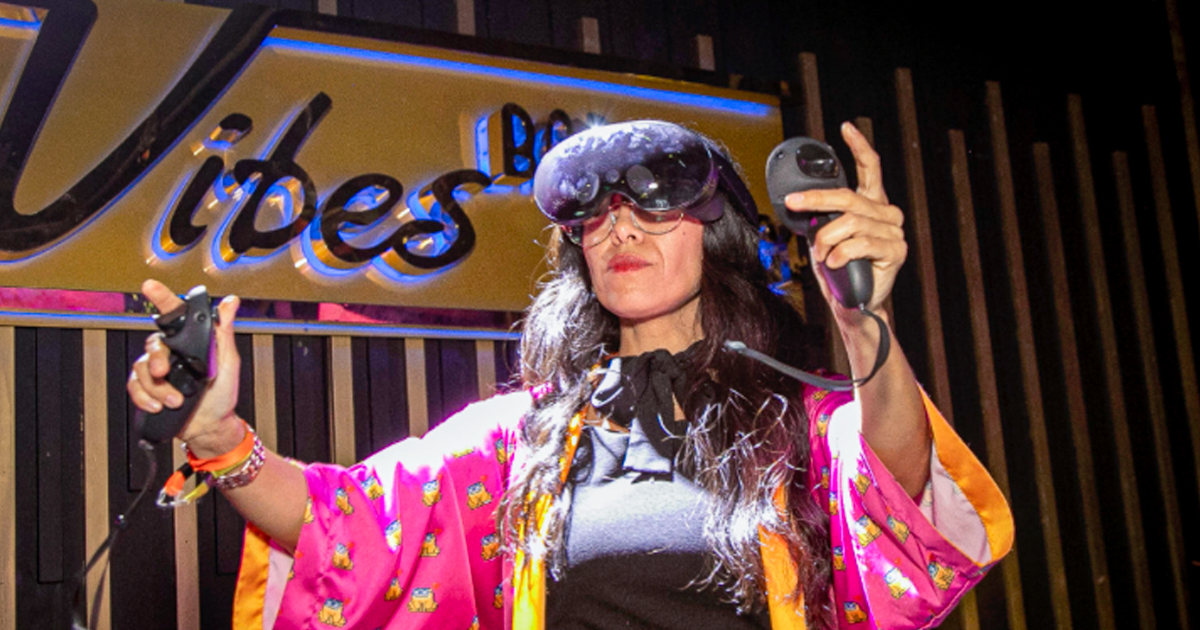Entertainment
Playing Martin Luther King Jr. and Malcolm X 'terrified' the stars of 'Genius: MLK/X'
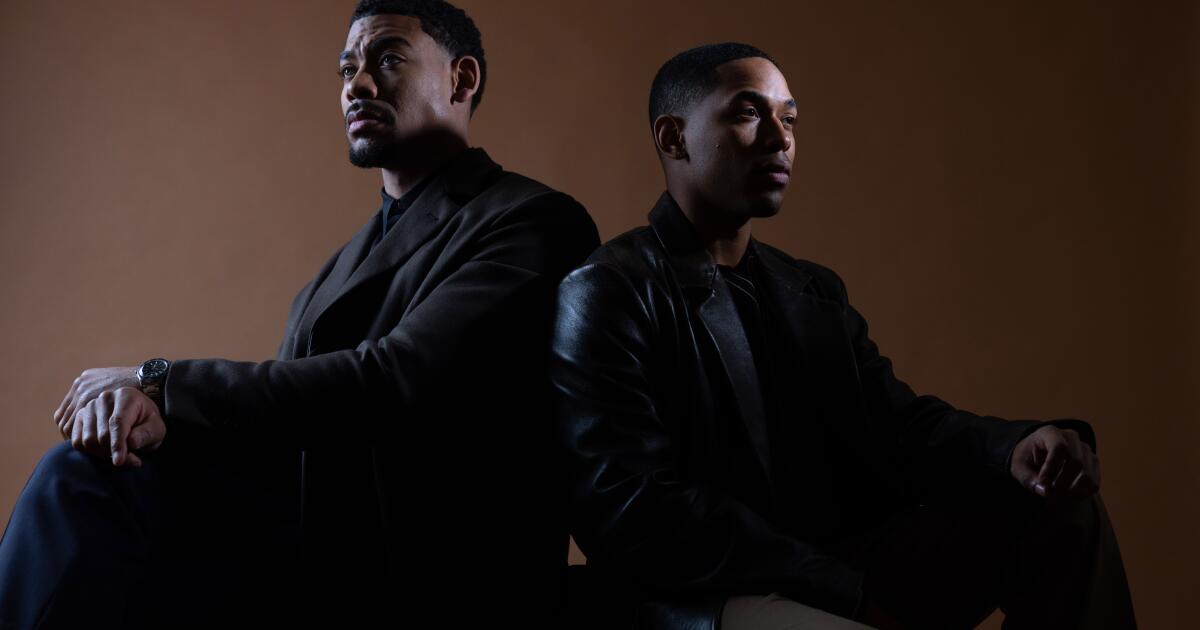
Kelvin Harrison Jr. and Aaron Pierre had the same reaction after learning that they had been hired to play the Rev. Martin Luther King Jr. and Malcolm X, respectively, in National Geographic‘s “Genius: MLK/X.”
Terror.
Not only did they both initially feel overwhelmed by the daunting responsibility of portraying the iconic civil rights leaders but they also felt their performances would likely be compared to those of others. Denzel Washington portrayed Malcolm X in the eponymous 1992 film that earned him an Oscar nomination, Samuel L. Jackson starred as King in Katori Hall’s Broadway production of “The Mountaintop” and James Earl Jones also portrayed King in the miniseries “Freedom to Speak.”
But with the support of friends and producers, Harrison and Pierre eventually overcame their doubts, delivering distinctive and bold portraits of the two men.
“MLK/X” is the fourth season of “Genius,” a biographical anthology series that has focused on Albert Einstein, Pablo Picasso and Aretha Franklin in previous installments. The final two episodes of the eight-part season, which premiered Feb. 1, run Thursday on National Geographic and stream the following day on Hulu and Disney+.
Co-starring as King’s wife, Coretta Scott King, is Weruche Opia (HBO’s “I May Destroy You”), and Jayme Lawson (“Till”) plays Betty Shabazz, the wife of Malcolm X. The executive producing team includes Gina Prince-Bythewood, Reggie Rock Bythewood, Brian Grazer and Ron Howard.
Harrison (“Chevalier”) and Pierre (“Foe”) knew each other — they are both involved in the upcoming “The Lion King” prequel, “The Lion King: Mufasa.” Pierre plays the title character, while Harrison plays the villain Scar.
Even though they share only a few scenes in “Genius,” they clearly became bonded during the project and expressed a palpable fondness for each other during a recent joint interview at a Pasadena hotel. Pierre occasionally patted Harrison’s knee during the discussion, calling him “my best friend.” This conversation has been edited for length and clarity.
1
2
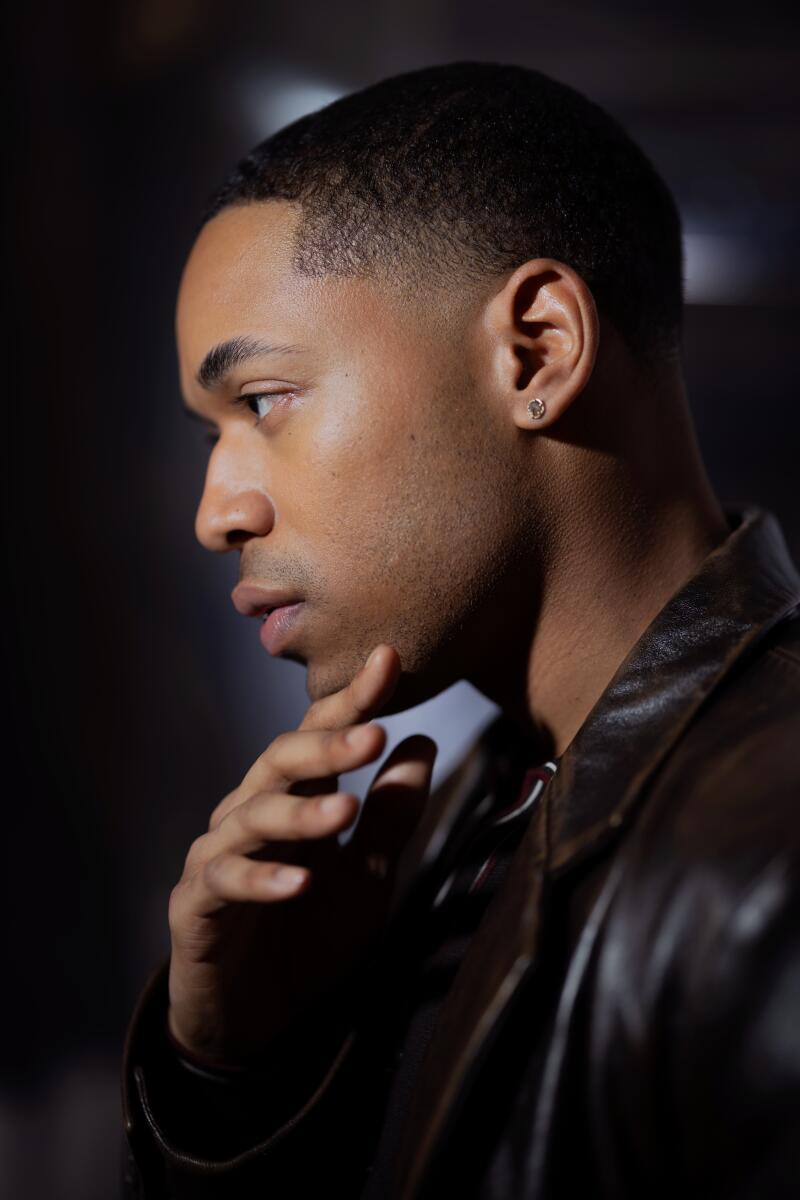
1. Aaron Pierre plays Malcolm X. 2. Kelvin Harrison Jr. plays the Rev. Martin Luther King Jr. (Christina House / Los Angeles Times)
It must have been good news to be cast in this series, but I’m sure it was also scary.
Harrison: Initially, I was terrified. I didn’t know whether it was appropriate for me to be cast. I was 27, 28 years old, had just started acting and hadn’t lived that much life. I feel I have gotten the benefit of Dr. King’s and Malcolm’s work, but what was it that I could do to bring a further understanding of it? Then I thought, “I just have to get over myself.” The producers told me Dr. King was young when he began his journey. There was a lot of responsibility bestowed on him. Plus, he had a wife and kid. I felt a little naive, but that also fits in with the story we’re telling. It’s about taking on that naivety and not mistaking it for ignorance or a lack of intelligence. It’s also about not losing that sense of hope that we have in our country and our identities in who we are, putting one foot in front of the other and walking in faith. Then I got excited thinking, “I can’t believe I get to go on this journey.”
Pierre: I share that sentiment. I’m the same age as Kelvin. When I got the call, I questioned whether I had the capacity, the endurance, the durability, the emotional intelligence, the life experience. I didn’t say yes immediately because I needed to sit with that and understand what that feeling was and how I was going to channel those feelings into something that would propel me forward as opposed to prohibiting me. Once I thought I could do that, largely because of the support network about me personally and creatively, I knew I could begin embarking on the journey. You find joy in it, which is so important because what these men did needs to be celebrated and championed.
1
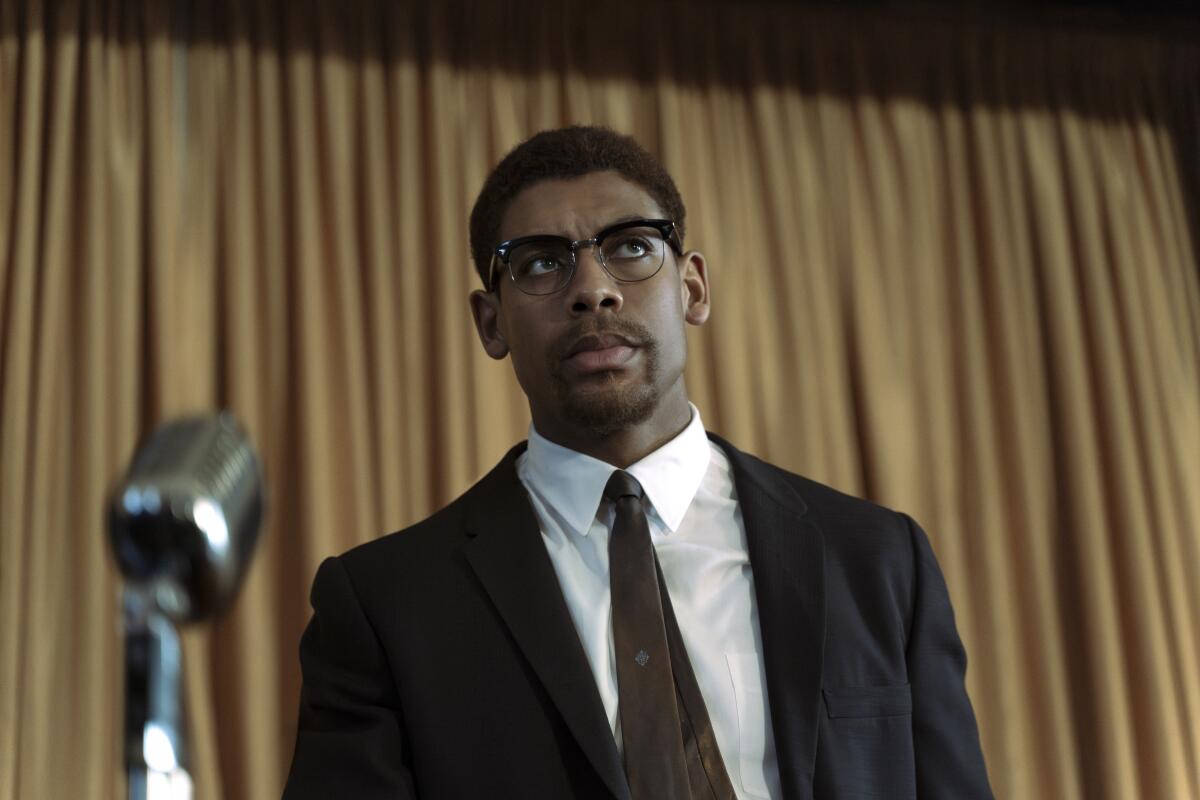
2
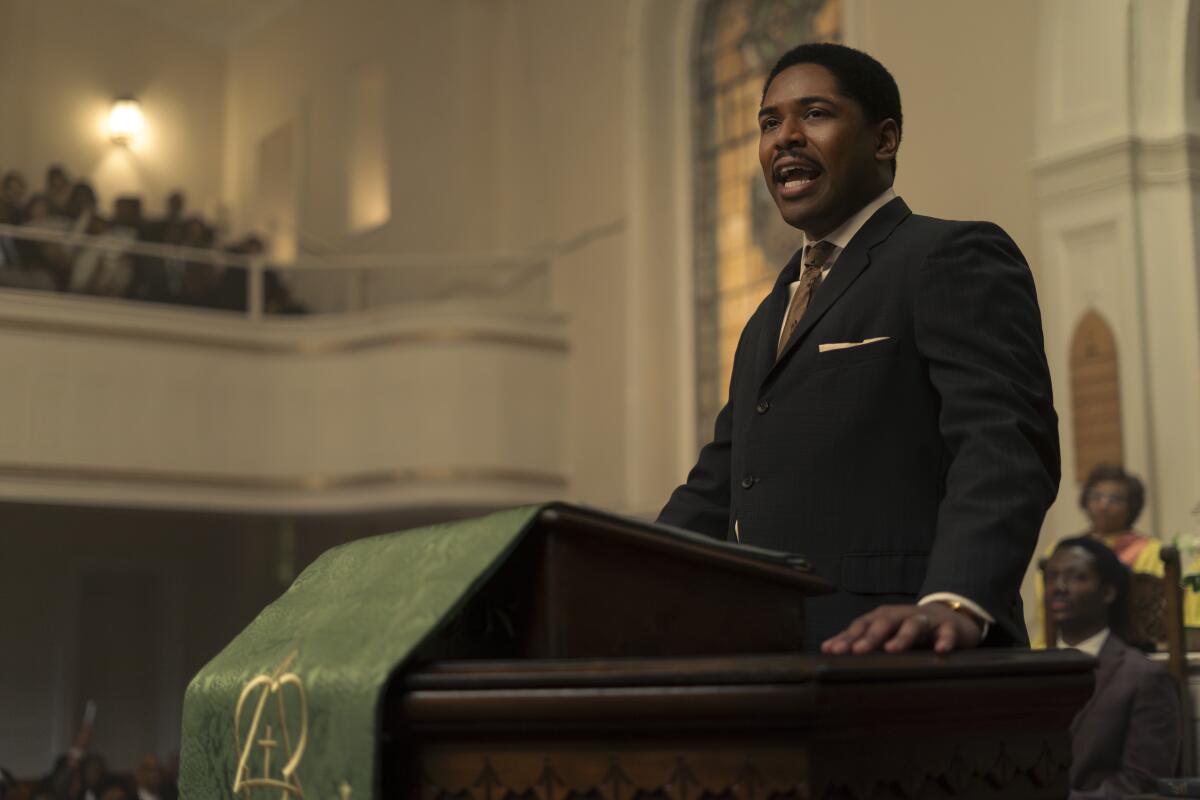
1. Aaron Pierre as Malcolm X in “Genius: MLK/X.” (Richard DuCree / National Geographic) 2. Kelvin Harrison Jr. as the Rev. Martin Luther King Jr. (Richard DuCree / National Geographic)
What was the research process like?
Pierre: We both watched and absorbed a tremendous amount of historical footage. I went to “The Autobiography of Malcolm X,” which is something I think I will revisit more than once in my lifetime. Then there’s “The Sword and the Shield: The Revolutionary Lives of Martin Luther King Jr. and Malcolm X,” which I trusted implicitly with its historical knowledge and insight. I visited Harlem, which fueled me in a very beautiful way.
Harrison: My initial instinct was to watch every movie about Dr. King, but my young actor brain and every actor I respected said, “Stay away from doing that.” So I refused that impulse. Then I had to figure out what those actors did. What I found out is that they brought a little bit of themselves to the role. I had to do an investigation of myself to figure out how to bring my humanity.
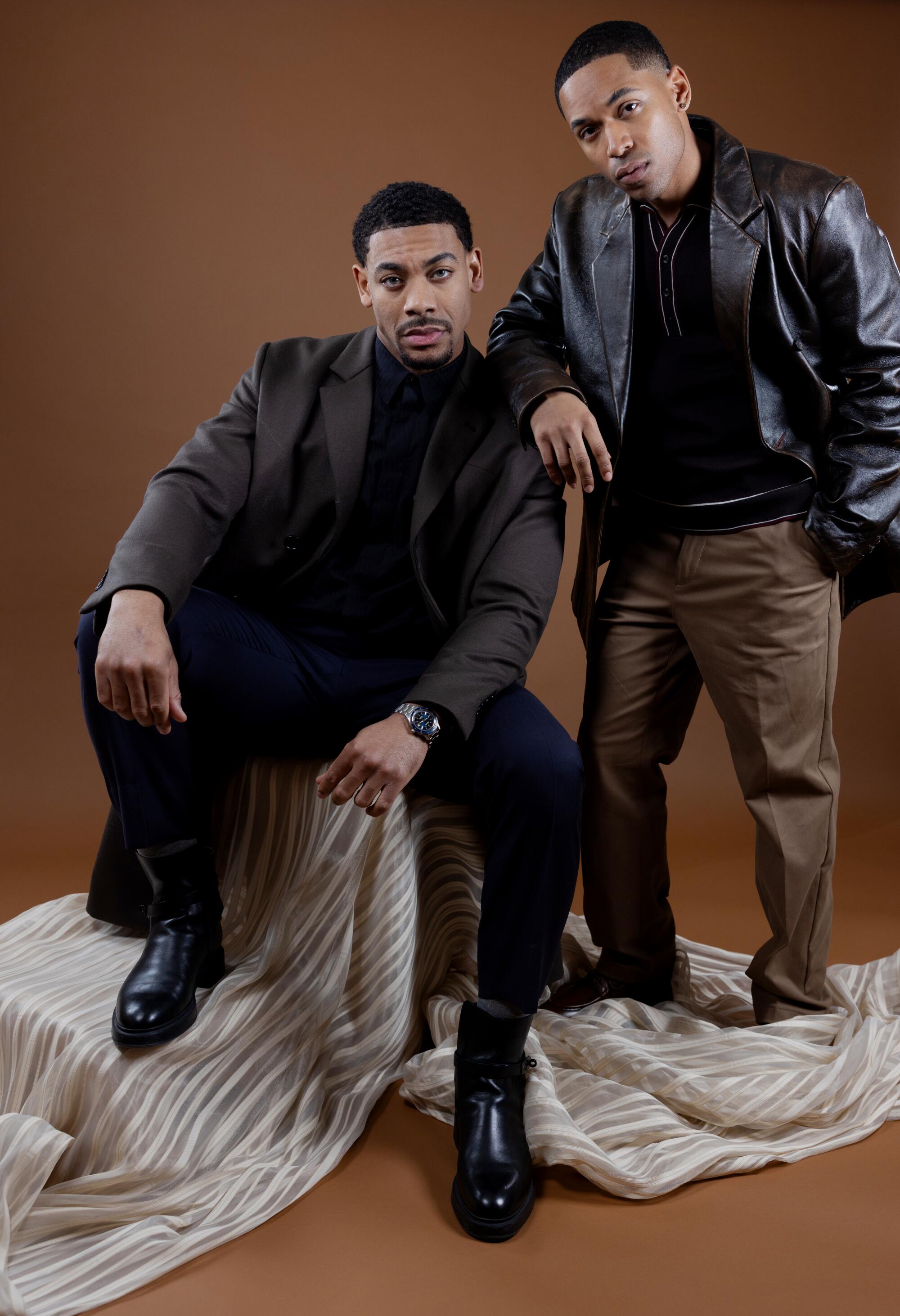
To prepare for their roles, Aaron Pierre, left, with Kelvin Harrison Jr., says they “both watched and absorbed a tremendous amount of historical footage.”
(Christina House / Los Angeles Times)
Aaron, were you intimidated by Denzel Washington’s acclaimed performance as Malcolm X in Spike Lee’s film?
Pierre: Denzel is a hero of mine. I have the utmost respect for him, not only artistically but personally. I had to manage that a hero of mine had played a hero of mine. I dealt with that by accepting that truth and then setting it free. Once I did that, I was able to permit myself to be liberated and safe enough to explore my own portrayal and bring my own life experience to Malcolm.
Kelvin, you had a similar situation. The actors who have played King include Jeffrey Wright and James Earl Jones.
Harrison: It’s kind of none of my business at a certain point. Dr. King was called to do something. If the people behind this project are calling me to do this, they see something in me I can’t see. And it’s arrogant for me to sit there and debate about it.
Pierre: At a certain point, we made peace with that fact, realizing all we can do is do our best. We use everything in our power to serve these tremendous men and their stories and legacies. Beyond that point, we have to set it free and let it be. It’s the only way to protect your well-being.
King and Malcolm X’s stories are told on parallel tracks. You share only a few scenes, but it’s clear you felt connected to each other.
Pierre: Absolutely. Aside from the professional work we share, this is one of my dearest friends. There’s a true sense of support and seeing one another through each others experience. We have so many parallels and similarities of our respective lives. We didn’t see each other a lot on set, but when we did, we checked in with each other. We understood that what we were embarking on was not easy. It required vulnerability.
Harrison: One of the times we did connect was when he came over to my little apartment in L.A. He brought doughnuts and I cooked. We talked about everything — how our journeys were going so far. Then we watched “Devil in a Blue Dress” with Denzel and Don Cheadle. We filled our cups with these beautiful portrayals. It was inspiration. It’s so easy to want to retreat when you’re on a journey like this. You get overwhelmed. You want to say, “This is too hard, I’m backing out.” So it’s important to have those moments to reconnect and say, “We’re in this together.”
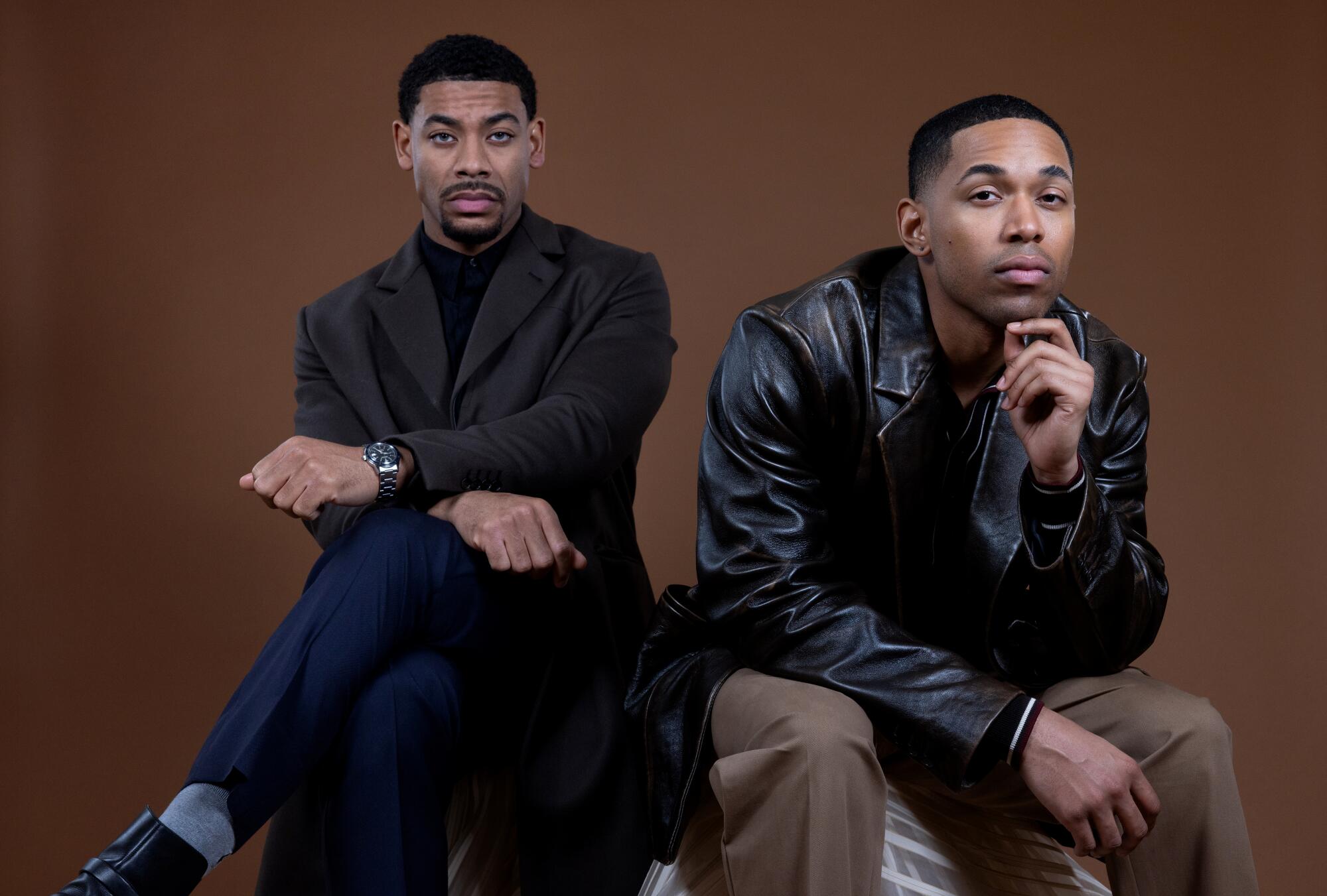
The actors say they tried to support each other in their roles. “We talked about everything — how our journeys were going so far,” says Kelvin Harrison Jr.
(Christina House / Los Angeles Times)
What was the most challenging day for you both?
Pierre: If we’re being honest, every day was challenging. This isn’t an engagement that ended with the final scene of the day. This demanded that we be engaged every day for the five or six months we did this. Every day we felt the weight of wearing those jackets.
Were you ever able to relax? What did you do to relieve stress?
Pierre: I’m really very grateful to Kelvin and Weruche. I have a tendency, no matter what the project is, but particularly with a project of this magnitude, to completely immerse myself for the duration. But they really looked after me. I would just be sitting in my trailer, in the suit with the glasses on, waiting for the next scene. Then one or both of them would drop by and say, “I brought you some shrimp.” They would bring joy. They contributed to the health of my personal well-being.
Harrison: I read somewhere that Martin’s favorite show was “Star Trek,” and he would watch that to decompress. So I thought, “I’ve got to find my own show.” So I got addicted to “Big Brother.” That was my “Star Trek.” I know that show is ridiculous, but I refuse to give it that label because it’s so good. It was like, “They’re stuck in this house. On the set, I’m stuck in this universe.” I related to them, and it would make me laugh and have fun.
What do you think audiences will learn from “Genius”?
Pierre: I hope it will dispel the myths and reveal the truth about the experiences of these men. There is a considerable amount of misinformation about Malcolm X. They need to gain the understanding that he operated from a place of love and light. Some might say he was advocating for physical engagement. I disagree. I think he was advocating for safeguarding and preserving the safety and livelihoods of your loved ones, your community and for those who look like you.
Harrison: Our job as storytellers is to inspire. With this story, I see it as a mirror to our country and the cyclical nature of it.

Movie Reviews
What If Jessica Chastain and Anne Hathaway Had a Mother-Off, and We All Lost?
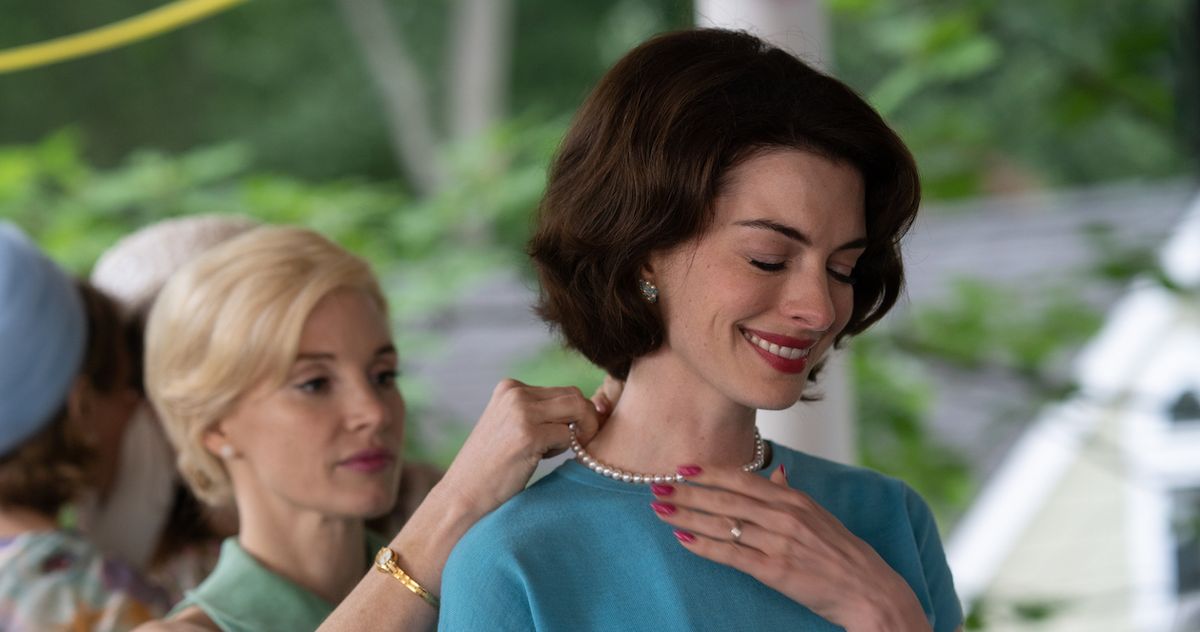
The strange case of Mothers’ Instinct.
Photo: Neon
There’s a new movie starring Jessica Chastain and Anne Hathaway out this week, which is normally the sort of thing you’d expect to have heard about. But, after its release in the U.K. months ago, Mothers’ Instinct is slipping into U.S. theaters with as little splash as an Olympic diver nailing a triple somersault tuck. The film, a thriller directed by Benoît Delhomme, is getting the treatment typically reserved for a disaster, which is a shame, because I’ve been dying to discuss it with someone, and that’s hard when no one has any idea what you’re on about. Mothers’ Instinct is, indeed, pretty terrible, and not in the so-bad-it’s-good sense, and yet there’s something strangely moving about it. It’s a poignant example of how what looks like rich material to actors can turn out to be lousy material for audiences. Mothers’ Instinct is a remake of a 2018 Belgian film adapted from a novel by Barbara Abel, and watching it, you can appreciate exactly why these two major actors signed on to star in it. Funnily enough, those same qualities go a long way toward explaining why the movie doesn’t work.
Mothers’ Instinct isn’t camp, but it’s close enough that if you squint, you can almost see a version of the film that tips into something broader. Of course, if you squint, you wouldn’t be able to appreciate how immaculately Chastain and Hathaway are costumed. They look incredible — not like two 1960s housewives, which is what they’re playing, so much as two people who keep switching outfits because they can’t decide what to wear to the high-end Mad Men–themed party they’re headed to later. As Alice, Chastain is styled like a Hitchcock blonde in pin-curled ash updos and cardigan sets, while as Alice’s neighbor and friend Céline, Hathaway is given a Jackie O. look that involves a shoulder-length bouffant, pillbox hats, and gloves. They’re cosplayers in a gorgeous, airless setting, adjoining houses on a street that might as well be floating in space, the husbands (played by Anders Danielsen Lie and Josh Charles) vanishing to work for long stretches. The artificiality of this intensely manicured re-creation isn’t to any particular end, which gives the whole movie the air of a Don’t Worry Darling situation in which no one ever wakes up to the twist, instead sleepwalking through a stylized dream of Americana.
In fact, while Alice is restless over having given up her job as a journalist to take care of her son Theo (Eamon O’Connell), and Céline gets ostracized by the community after the death of her son, Max (Baylen D. Bielitz), Mothers’ Instinct isn’t actually all that interested in the pressures of living under a repressive 1960s patriarchy. Instead, it’s about another time-tested theme, one that’s best summed up as: Bitches be crazy. The perfect sheen of its surfaces — Delhomme, who’s making his directorial debut, is a cinematographer who started his career with The Scent of Green Papaya and has since worked with everyone from Tsai Ming-liang to Anton Corbijn — is paired with a score that shrieks unease from the opening scene, in which Céline is thrown a surprise birthday party. The source of this suspense isn’t revealed until later, after Max takes an unintended swan dive off the porch and the women’s friendship is threatened by grief, guilt, and suspicion. Is Céline in mourning, or does she actually irrationally blame Alice for what happened while developing an alarming fixation on Theo? Is Alice right to be suspicious of her bestie, who’s unable to have another baby, or is she being paranoid because the mental illness that previously resulted in her hospitalization has returned? Is it odd that two feminist actors jumped to participate in a film that traffics so freely in unexamined stereotypes about women and hysteria?
Not, it seems, when the opportunities to stare coldly into space or look on in glassy betrayal are this good. I’m not trying to sound snide here — the characters in Mothers’ Instinct have no convincing inner lives at all, but the exterior work of the actors playing them is choice stuff. When Alice and Céline are getting along, Chastain and Hathaway nuzzle together supportively like long-necked swans. When things start to go south, Chastain opts for an aloof distance with stricken eyes, while Hathaway prefers a labored smile that drops as soon as she’s alone. Theirs is a brittle-off no one can win, but both try their hardest anyway. The effort reaches its crescendo at Max’s funeral, where Hathaway’s enormous eyes glimmer through the barrier of a black lace veil and Chastain tilts her face up so that the elegant tracks of past tears can gleam in the light. The scene ends with Céline collapsing in anguish while Alice rushes her tantrumming child out of the church, an explosion of drama that would be so much more effective if the movie had left any room for modulation instead of starting at 10 and staying there. Mothers’ Instinct gets much sillier before it ends, but given how little it establishes as its baseline tone, it doesn’t feel fair to say it goes off the rails. Rather, as Hathaway stares brokenly into the dark and Chastain tears apart her nightstand drawer in panic, what comes to mind is how great a set of GIFs this movie will make someday. That’s not much, but I guess it’s something?
See All
Entertainment
Tyler Perry calls out 'highbrow' critics, defends his fans: 'Don't discount these people'
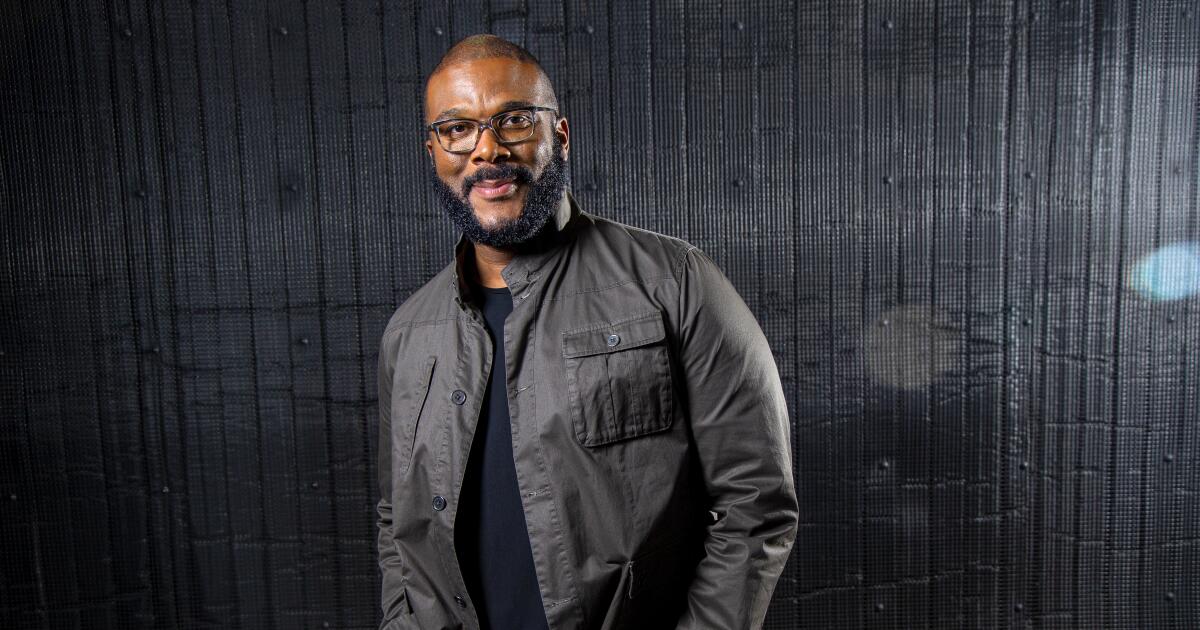
Tyler Perry’s last feature film earned a rare 0% on Rotten Tomatoes — a point that’s apparently of little concern to him.
The billionaire filmmaker, best known for his franchise character Madea, is far more interested in the opinions of his fans than those of “highbrow” critics, he said on the “Baby, This is Keke Palmer” podcast.
“For everyone who is a critic,” Perry said in the Tuesday episode, “I have thousands of — used to be — emails from people saying: ‘This changed my life. Oh, my God, you know me. Oh, my God, you saw me. How did you know this about my life and my family?’ So that is what is important.”
Critiques of Perry and his purportedly flat depictions of Black characters date back to his early directing days. Spike Lee, for one, in 2009 famously alluded to Perry’s work while complaining about the “buffoonery” in Black comedy. More recently, playwright Michael R. Jackson took his turn swinging at the movie mogul in his metafictional musical “A Strange Loop.”
In the number “Tyler Perry Writes Real Life,” Jackson’s protagonist — a Broadway usher who dreams of being a writer — denounces Perry’s oeuvre: “The crap he puts on stage, film and TV / Makes my bile want to rise!”
The song wasn’t born of any “personal vendetta,” Jackson told Washington Post Live in 2022. “It’s really about actually taking Tyler Perry’s work very seriously, because it’s often held up, often by Black communities, as sort of, like, the end-all-be-all of what one can do as a Black artist.”
“I just wanted to sort of problematize that and satirize that,” he said.
Upon Palmer referencing Jackson’s musical jab, Perry told the podcast host, “I know for a fact that what I’m doing is exactly what I’m supposed to be doing.”
When it comes to critics in general, he continued, it’s best to “drown all that out.”
“We’re talking [about] a large portion of my fans who are disenfranchised, who cannot get in the Volvo and go to therapy on the weekend,” he said. “So you’ve got this [Black critic] who is all up in the air with his nose up looking at everything, and then you’ve got people like where I come from, and me, who are grinders, who really know what it’s like, whose mothers were caregivers for white kids, and were maids and housekeepers.”
He added: “Don’t discount these people and say that their stories don’t matter. Who are you to be able to say which Black story is important or should be told? Get out of here with that bull-.”
Corey Hardict, who co-stars in Perry’s latest film “Divorce in the Black,” last week invoked a similar defense for the critical bomb: “I mean, the people love the movie and we do it for the people — that’s who I do it for. If the culture’s rocking with it, it’s all love. So it’s fine.”
Perry’s podcast comments have already garnered backlash online, with Preston Mitchum of the reality show “Summer House: Martha’s Vineyard” writing Wednesday on X, “Yes, because writing and producing a movie where a Black woman from a small town cheated on her husband, acquired HIV, then ended up physically disabled is absolutely the groundbreaking Black story we need to see.”
Mitchum’s post seemingly refers to Perry’s 2013 film, “Temptation: Confessions of a Marriage Counselor.”
Palmer defended Perry against other disparagers online, writing Wednesday on X, “The enemy isn’t Tyler it’s the system that makes it hard for multiple black artist[s] to shine at one time.”
“Tyler is not the gatekeeper of all black stories he’s just one creative who broke through the system,” she wrote. “Advocating for others to do the same is the fight, not hating Tyler for his work that many do love.”
Perry in 2019 celebrated the grand opening of his 330-acre Tyler Perry Studios in Atlanta. He created the complex with the hope of promoting cultural diversity in the film industry, he told The Times in 2016.
“Sometimes I drive around here by myself and think, ‘Is this too much, or is this what I’m supposed to do?’ ” Perry said. “The answer is obvious. When this fell into my lap, I said, ‘I have to do this.’ This is the endgame.”
Movie Reviews
Movie Review: Twisters – Kenbridge Victoria Dispatch

Movie Review: Twisters
Published 11:15 am Friday, July 26, 2024
1 of 3
Let me immediately cut to the chase (pun intended) and answer the question you’re all wondering. TWISTERS is a fun and entertaining summer blockbuster, but it in no way holds a candle to its predecessor TWISTER (1996). Still, the CGI is intense, the sound design is loud and immersive, and the lead performances — especially from Glen Powell — are sure to wow.
Following a horrible tragedy, meteorologist Kate Carter (Daisy Edgar-Jones) has spent years out of the storm chasing business. She now lives in the largely tornado-less New York City, using her innate understanding of storm systems to direct weather alerts. But when her old friend Javi (Anthony Ramos) begs her to join his privately-funded start-up, which is designed to use military-grade radars to learn more about tornadoes and save communities in Oklahoma, she agrees to give him a week of her time. It’s not too long before “tornado wrangler” influencer Tyler Owens (Glen Powell) enters the scene with his ragtag group of weather enthusiasts, creating a competition between scientific research and entertainment. Each group races to be the first on the scene, with Kate and Javi seeking to model the tornado and Tyler trying to get the most likes on social media. But can the two groups find a way to work together or will the competition be more vicious than the tornadoes?
I am admittedly judging myself for caring too much about a summer blockbuster’s plot, because that’s not really what any of us sign up for with these films. But the various encounters with tornadoes begins to feel slightly repetitive and creates pacing issues, making a two-hour film feel like its runtime. And for some reason, it seems like there is something missing when it comes to portraying the sheer terror of experiencing F5 tornadoes, unlike the original film; the main set pieces were not as memorable.
The film does little to make you care about whether the characters live or die, relying on Glen Powell and Daisy Edgar-Jones’s chemistry and natural charisma to do the heavy lifting. The second Powell steps out of his gigantic truck, with his cowboy hat and belt buckle sparkling in the sun… sorry, I just lost my train of thought… and that’s what TWISTERS is hoping. Powell’s magnetism is sure to knock you off your feet and distract you from the film’s middling plot. And while Edgar-Jones’s performance is more muted, due to her character’s battle with PTSD, she brings an important level of humanity to the film and a character to both see yourself in and root for. More than that, her chemistry with Powell is off the charts and will certainly leave you wanting their relationship explored more in a sequel. The supporting characters are not given much to work with and as such, don’t really engender much concern when they are in deadly situations.
One element of TWISTERS I liked more than TWISTER is it showed the emotional and financial toll tornadoes ravage on communities. Of course, that is an element of the first film, but TWISTERS does a great job showcasing the speed in which tornadoes can overtake and devastate a community, both in loss of life and loss of property. This, juxtaposed with the “fun” in chasing storms brings a real human element to the film. I also want to give a shoutout to the movie not having any sad animal scenes (apart from a possible run-in with a chicken). So for all of you sickos excited to see another flying cow, this isn’t for you.
TWISTERS is the exact kind of movie you need to see in a theater so you can get the full experience. Where else can you admire the cinematography, get immersed in the sound design, and lose yourself in Glen Powell’s cowboy hat and million dollar smile? I saw it in a Dolby theater and was blown away.
There is no end credit scene.
My Review: B
-

 World1 week ago
World1 week agoOne dead after car crashes into restaurant in Paris
-

 Midwest1 week ago
Midwest1 week agoMichigan rep posts video response to Stephen Colbert's joke about his RNC speech: 'Touché'
-

 News1 week ago
News1 week agoVideo: Young Republicans on Why Their Party Isn’t Reaching Gen Z (And What They Can Do About It)
-

 News1 week ago
News1 week agoIn Milwaukee, Black Voters Struggle to Find a Home With Either Party
-

 Politics1 week ago
Politics1 week agoFox News Politics: The Call is Coming from Inside the House
-

 News1 week ago
News1 week agoVideo: J.D. Vance Accepts Vice-Presidential Nomination
-

 Movie Reviews1 week ago
Movie Reviews1 week agoMovie Review: A new generation drives into the storm in rousing ‘Twisters’
-

 World1 week ago
World1 week agoTrump to take RNC stage for first speech since assassination attempt

